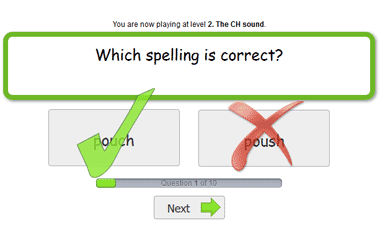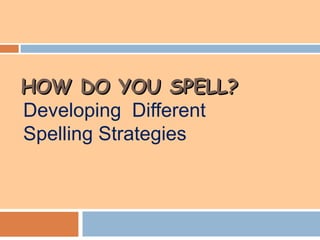Mastering "How Do You Spell?": Your Ultimate Guide To English Orthography
Have you ever found yourself pausing mid-sentence, fingers hovering over the keyboard, wondering, "How do you spell that word?" If so, you're certainly not alone. English spelling, compared to most other languages, can often feel like a tangled mess. The sound frequently doesn't match the spelling, leading many to think, "Do you think spelling is stupid?" But while it presents its unique challenges, mastering English orthography is a crucial skill for clear communication, both in writing and sometimes even in speech. This article will delve into the intricacies of English spelling, offering practical tips, fundamental rules, and valuable resources to help you write confidently.
What Exactly Is Spelling?
At its core, the meaning of SPELLING is the forming of words from letters according to accepted usage: orthography. It's the process of naming, writing, or otherwise giving the letters, in order, of a word, syllable, or even a name or address. While pronunciation often goes hand-in-hand with spelling, English has many instances where the sound doesn't directly dictate the letters. For example, knowing "What's the Correct Pronunciation of 'Clinton'?" might not tell you how to spell it if you've never seen it written. Similarly, while generally sounds are spelled phonetically, some sounds develop a common spelling that might not be obvious at first glance, like the typical goose noise.
The Quirky World of English Spelling
Indeed, English spelling is a mess compared to most other languages. The sound often doesn't match the spelling, so we must memorize the spelling on its own. There are many tricks, but also many exceptions. This leads to common confusions, even for native speakers. Let's look at a few examples:
- Homophones and Homographs: Words that sound the same but are spelled differently (homophones) or words spelled the same but have different meanings and sometimes different pronunciations (homographs). Take the word "minute." It is spelled minute, which can be confusing to some people because it is the same spelling as the word minute meaning sixty seconds. However, "minute" can also mean extremely small, like in size. Another example is "tear." If you ask, "How do you spell tair as in I am going to tair my shed down?" The verb is spelled tear. "I'm going to tear my shed down." The same verb is used if you tear paper, or tear your clothes.
- Suffixes and Tenses: Adding suffixes can change a word's spelling. The spelling is "meant" (past tense, past participle of to mean). The spelling -ment is a suffix that can form nouns from verbs (e.g., accomplishment), but it's not the past tense of "mean." Another example is "surplused." The correct spelling is "surplused." The word is formed by adding the suffix "-ed" to the noun "surplus," which means an amount that exceeds what is needed.
- Indefinite Articles: Even simple words like "a" or "an" can be tricky. "A" or "an"? What about before 'h'? An Indefinite Article Guide can help. For instance, is it 'A historic' night or 'An historic' night? The rule often depends on the sound that follows, not just the letter.
- Misspellings: Sometimes, a word is simply misspelled due to phonetic assumptions. For example, "How do you spell dregrees?" The word sought is probably the plural noun "dresses."
British vs. American English: A Tale of Two Spellings
One significant source of confusion stems from the differences between British and American English spelling. While both are correct within their respective regions, knowing which to use is important depending on your audience. Learn how to spell words in British English following basic rules and common patterns. Find out the differences and similarities with American English and the exceptions to the rules.
A classic example is the verb "to spell" itself. Learn the difference between spelt and spelled, two forms of the verb to spell, and when to use each one. Spelt is more common in British English, while spelled is preferred in American English. Similarly, "What is the correct spelling of the word cancelling?" Cancelling is the way you spell it in British English and Canceling is how you spell it in American English.
Fundamental Rules and Strategies to Improve Your Spelling
Despite the quirks, there are many tricks and rules that can significantly improve your spelling skills. Learn how to spell by understanding spelling rules, practicing regularly, and reading widely. Here are some key strategies:
- Basic Spelling Rules: Learn some basic spelling rules and tips to improve your spelling skills in English. These include rules for short-vowel, two-vowels, vowel-consonant-e, and using 'y' as a long 'i' or 'e'. Learn how to spell words correctly with these fundamental spelling rules. Find out how to use vowels, consonants, suffixes, prefixes, and apostrophes in different situations.
- Key Spelling Rules: Learn how to spell words correctly with these five key spelling rules. Find out how to add suffixes, use plural suffixes, handle the silent 'e', and deal with double consonants.
- Break Down Words: If you know how to spell smaller words or segments within the word, such as a prefix, spell those first. Then look for common letter patterns. This segmenting technique can make longer words less intimidating.
- Practice Techniques: Learn how to spell new words with a technique: look – cover – write – check. This method helps engrain the correct spelling through active recall and repetition.
- Reading Widely: Exposure to correctly spelled words through extensive reading is one of the most effective, albeit passive, ways to improve your spelling intuition.
Practical Tips for Everyday Spelling
Beyond memorizing rules, there are practical steps you can take in your daily life to enhance your spelling accuracy:
- Asking for Spelling: Sometimes, the easiest way is to simply ask. Learn how to ask and answer spelling questions in English with grammar, vocabulary, and examples. Find out how to spell words, names, and addresses correctly and avoid common mistakes.
- Using a Dictionary: Your dictionary is your best friend. Learn how to look up words, find definitions, pronunciations, and usage labels in the dictionary. See examples of words with multiple meanings, origins, and regional variations.
- Leveraging Technology: Most modern writing tools have built-in spell checkers. For instance, after opening a New mail for composing email, you will find the option "Editor" on the right top corner. Select Editor > Editor Settings. You will find options for spell checking. While helpful, remember that spell checkers aren't foolproof and might miss context-based errors (e.g., "their" vs. "there").
Resources to Boost Your Spelling Skills
The journey to excellent spelling is ongoing, and thankfully, many resources are available to help. How to Spell is here to help you learn, improve, or teach spelling with free lessons and exercises. It’s never too late to learn to spell well and write confidently.
You can find more free lessons & exercises at https://www.howtospell.co.uk. They offer foundational spelling strategies, such as the video now free at https://howtospell.co.uk/foundation-spelling-strategies. These resources provide structured learning paths to help you grasp the rules and patterns of English orthography.
In summary, while English spelling presents its unique set of challenges due to its inconsistent phonetic nature and diverse origins, it is a skill that can be mastered. By understanding the definition of spelling, recognizing common pitfalls, being aware of regional differences, and diligently applying fundamental rules and practice techniques, you can significantly improve your accuracy. Utilizing dictionaries and dedicated online resources like howtospell.co.uk will further aid your journey. Remember, consistent practice and a curious mind are your best tools for confidently answering the question, "How do you spell that?"

How do you spell - English - Free online game

How to Spell Language: A Comprehensive Guide to Spelling Rules

How do you spell? | PPT